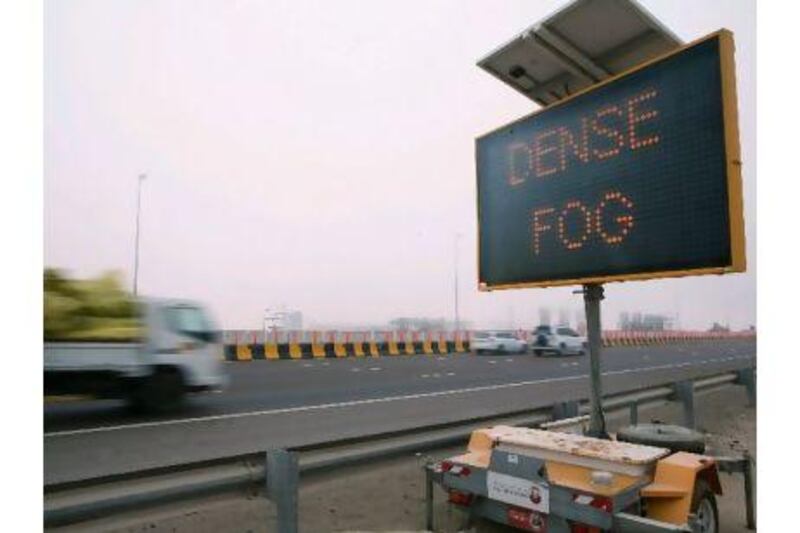Your article Speeding drivers in 32-car pile-up (October 19) uses the phrase "a car crash caused by fog".
Fog does not ''cause" crashes. While it might be a contributory factor to a crash happening, it is drivers who cause crashes and their inability to adapt their driving behaviour to road and climate conditions. It is a sad fact that a great number of drivers consider only themselves and their needs and have no consideration for other road users.
It should be remembered that it is far better to arrive late than dead.
Jeremy P Weeks, Abu Dhabi
I was on the road on Tuesday morning and saw people tailgating and speeding during those extreme conditions.
Those who parked their cars on the hard shoulder due to low visibility were on their mobile phones standing right next to the road. It was a disaster waiting to happen.
There is a dire need for action: of advance warning on the roads to warn drivers, to educate them on how to deal with such conditions and most importantly to penalise those who do not follow rules and so risk their own and others' lives. Fog comes several times every year and it more than justifies serious action.
Javed Anjum, Dubai
I have a small suggestion which could reduce the number of accidents on the road due to driving in foggy weather.
It would be useful if the working hours could be shifted one hour in the morning, so people would not have to drive in the fog. This shift would be applied only during the foggy weather, so maybe for a period of two to three months in the year.
Shaikha Al Ameri, Abu Dhabi
China horror is sign of the times
This is in regard to the article Outrage in China as toddler left for dead (October 19). The lack of social responsibility that has plagued much of the world, which in this case happens to be China, and other cases like the horrific rape and murder of a 13-year-old girl in Japan in 1988 show that people are less likely to help others during troubled times.
The recent incident of a mother and son's fall from a JLT building speaks of the same reluctance by our own fellow Dubai citizens who despite witnessing the events, couldn't come forward to help.
I think this problem is ever growing in Dubai. People have got to come forward and help others in times of need.
Farida, Dubai
Classical Arabic is the best option
I disagree with your advice in M magazine regarding learning Arabic (Ask Ali: On Arabic dialects, October 15).
The Egyptian and Levantine accents may be more widely understood, but no accent will give you a proper understanding of the actual language. In my opinion, it's better to learn classical Arabic, and then choose any local dialect depending on where you live.
Ahmed Al Hashemi, Dubai
Safer taxis offer raises questions
In reference to Dubai offers safer taxis, for a charge (October 18), what does it say about the safety of the roads when people have to pay "extra" to get in a safe taxi?
What does that say about the other taxi companies? How exactly are they "safer"?
Donald Glass, Abu Dhabi
Could a similar option be made available in Abu Dhabi? Maybe one where the drivers were guaranteed no more than an eight-hour working day.
I would gladly pay more if I knew my driver hadn't spent the last 14 hours zooming around city streets trying to eke out a living. Shorter working hours might possibly lead to fewer accidents, as the drivers won't be navigating cars at high speeds while exhausted. Call it EthiCab (as in ethical working conditions for cab drivers.)
Sonya Edelman, Abu Dhabi
India must insist on transparency
The prime minister of India, Manmohan Singh, said that the right to information (RTI) legislation, which has exposed some of the corruption in the country, needs to be revised or cut to size (as referenced in The death of an activist, October 14).
It is surprising that a person of the stature of Mr Singh is seeking curtailment of the RTI, which is now almost a fundamental and basic right of any citizen.
People who wish to govern India and occupy positions of leadership should accept that transparency in all transactions will be paramount.
In a democracy, transparency is critical to retain the faith of the people.
With Indians becoming more educated and aware, feudalism will ebb away. Governments will have to be more accountable.
Rajendra K Aneja, Dubai





